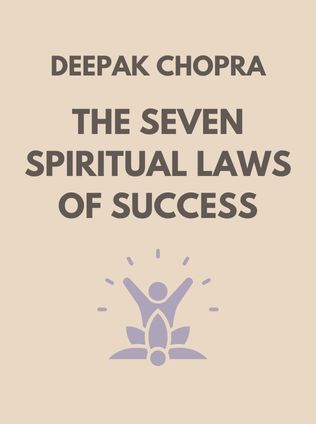
The Seven Spiritual Laws of Success
A Practical Guide to the Fulfillment of Your Dreams
By Deepak Chopra
Published 11/1994
About the Author
Deepak Chopra is a globally recognized author and speaker on the topics of spirituality and personal development. Born in India in 1946, Chopra initially pursued a career in medicine, earning his medical degree from the All India Institute of Medical Sciences. However, after moving to the United States and establishing a successful practice, he shifted his focus towards integrating holistic practices and spiritual teachings with conventional medicine. Chopra’s teachings draw heavily on the philosophies of ancient Indian spiritual traditions, particularly those of Vedanta and yoga. He has authored more than 80 books, many of which have become bestsellers, translated into numerous languages. His work emphasizes the connection between mind, body, and spirit, encouraging individuals to explore their inner worlds to find peace, fulfillment, and true success.
Main Idea
The core premise of Deepak Chopra’s "The Seven Spiritual Laws of Success" is that true success is not measured by material wealth, fame, or power, but by the alignment of our lives with the natural laws of the universe. Chopra argues that by following these spiritual laws, anyone can achieve success that is meaningful, lasting, and deeply fulfilling. These laws are not rigid rules but guiding principles that help us harmonize our inner spiritual life with the outer world, leading to a life of effortless ease and abundance. By understanding and applying these laws, we can align ourselves with the flow of universal consciousness and achieve our desires with less struggle and more joy.
Table of Contents
- The Law of Pure Potentiality
- The Law of Giving
- The Law of Karma
- The Law of Least Effort
- The Law of Intention and Desire
- The Law of Detachment
- The Law of Dharma
The Law of Pure Potentiality
The first spiritual law, the Law of Pure Potentiality, emphasizes that our essential state is one of pure consciousness, infinite potential, and pure possibility. According to Chopra, "we are, in our essential state, pure consciousness. Pure consciousness is pure potentiality; it is the field of all possibilities and infinite creativity." This means that within us lies the ability to achieve anything because we are connected to the source of all creation.
Chopra suggests that by practicing silence, meditation, and non-judgment, we can access this field of pure potentiality. Silence helps us to quiet the constant mental chatter, allowing us to connect with our true self. Meditation serves as a tool to transcend the limitations of our mind and reach the realm of infinite possibilities. Non-judgment helps us to maintain a state of pure awareness, where we do not categorize or label our experiences but accept them as they are.
Sign up for FREE and get access to 1,400+ books summaries.
You May Also Like
The Subtle Art of Not Giving a F*ck
A Counterintuitive Approach to Living a Good Life
By Mark MansonRich Dad Poor Dad
What the Rich Teach Their Kids About Money - That the Poor and Middle Class Do Not!
By Robert T. KiyosakiHow To Win Friends and Influence People
The All-Time Classic Manual Of People Skills
By Dale CarnegieQuiet: The Power of Introverts
The Power of Introverts in a World That Can't Stop Talking
By Susan Cain



















